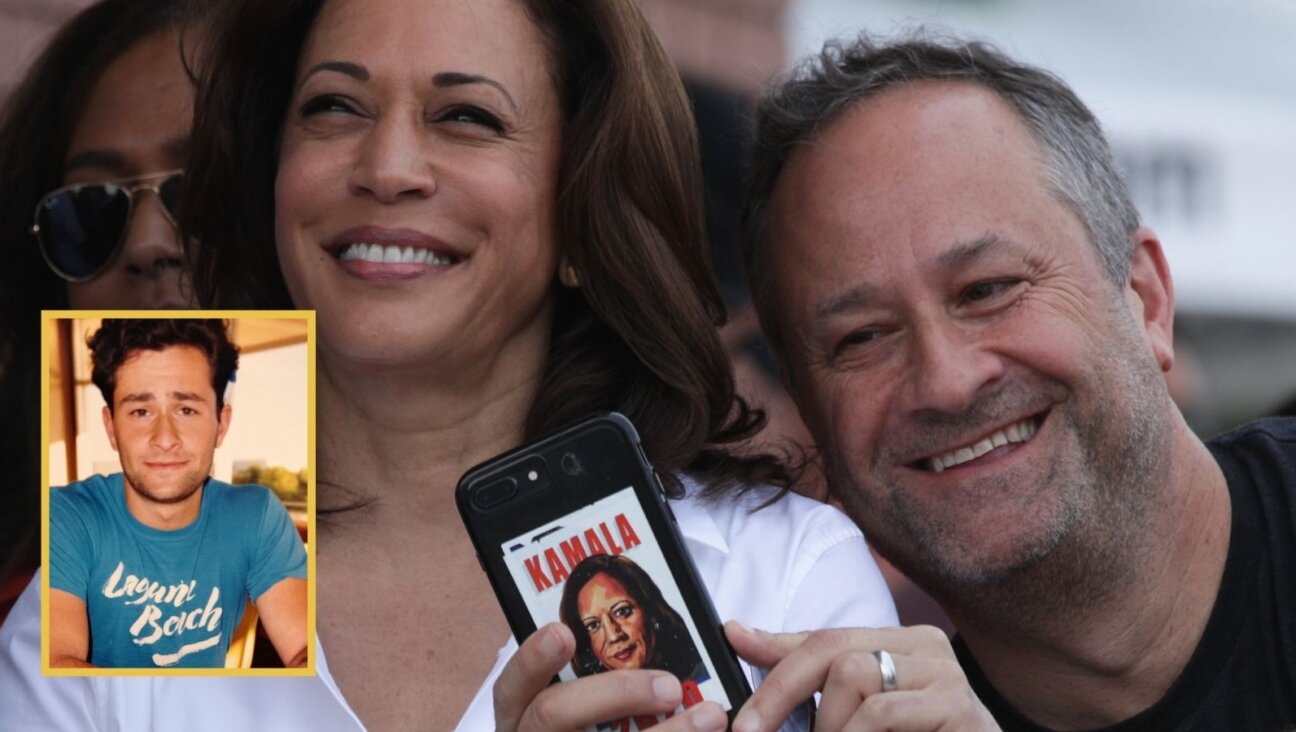How a Survivor’s Son Is Bringing Baseball to Israel

Image by Courtesy of IAB and Jewishbaseballmuseum.com
Baseball in Israel? Yes that most American of games is growing in popularity thanks to individuals like Peter Kurz.
The son of a father who fought in the Russian army in World War II and a mother hidden during the Holocaust in her native Hungary, Kurz grew up in Manhattan and was drawn early-on to two things: baseball and Zionism. He attended his first N.Y. Mets game at Shea Stadium in 1971 and cheered on his favorite player, catcher Jerry Grote. He would average five to 10 games attended at Shea Stadium each season.
In 1989, Kurz moved to Israel, where he works as a marketing consultant and lives with his wife and their three children. For 25 years, he’s been involved in the Israel Association of Baseball and now serves as president. The IAB today boasts 850 children and young adults playing in six divisions. And in July 2014 in Slovenia, Israel’s national adult team finished first in the European Championships’ C pool.
Israeli baseball’s international presence is best known in two ways. The Israel Baseball League started (and ended) in 2007, with three of its six teams managed by Jewish former major leaguers. And in 2012, an Israeli team competed at the World Baseball Classic. It was managed by former major leaguer Brad Ausmus, and several of its players – all Jewish Americans – later reached the major leagues: Joc Pederson, Josh Zeid, Nate Freiman, Cody Decker and Josh Satin.
In the 2016 WBC, Israel’s team will play its games in that most iconic of Jewish-American places: Brooklyn. Max Wildstein of Hardballscoop.com examines the potential Israeli roster for the qualifying round games in September. Kurz talks about the state of baseball in Israel and hopes for the future.
How did you get involved in the IAB?
Kurz: I was on reserve duty in 1998, and somebody told me then about baseball in Israel. I had not been involved in things American. My wife’s Israeli, and we had mostly Israeli friends. I took my son to the Sportek [field] in Tel Aviv. A gentleman by the name of Leon Klarfeld was the coach and the president of the IAB. My son was playing, and I sat to the side as a parent. [Klarfeld] asked me if I wanted to help coach. I said, “I grew up in Manhattan, and played softball. I knew baseball, but never was a coach.” He said, “Don’t worry about it. You know a lot more than these kids,” who were eight or nine years old. I started helping him coach. A month later, he said, “I’m moving up north, near Netanya, so you have to take over coaching the team.” Me, coaching the team? I thoroughly enjoyed it, and three months later, he said to me, “I want you to take a national team overseas.” My son was 10, so I took a team of 10-, 11- and 12-year-olds to Holland. He gave me a coach to take there, Shlomo Lipitz, who’s still with the national team and still pitching for us. … We lost every game by not less than 20 runs. It was one of the first times Israel took a national team overseas, so every team was better than us. I’ve been involved ever since as a coach, national team coach, manager, member of the board of directors, secretary general and now president.
What’s the importance of having a baseball scene in Israel?
There aren’t a lot of other opportunities in team sports in Israel. The Israeli sports scene is very competitive: soccer, basketball and handball. If you’re 10, 11 years old and you’re not one of the top players, you can’t play that kind of team sport. Baseball is a great sport, because it can be played by any kid. You don’t have to be tall, fast, strong – not necessarily the great athletes, although we encourage the great athletes to come out and play. We belong to the Positive Coaches Alliance, an organization in the States that believes in sportsmanship and teaching values to kids, and for the coaches to be role models. That’s why I do it. I love the sport, and I really think that baseball has a lot more to give than other sports.
Does baseball in Israel help bridge gaps and bring kids together?
My son Amit’s team in 1999 was made up of nonreligious kids from the Tel Aviv area and kibbutzim, and religious kids from Jerusalem, Beit Shemesh and Modiin. They all come together, practice once a week in the Baptist Village [a top-notch field in Petach Tikva] and get to know each other. Certainly, when they go overseas and live together for a whole week, they become a lot more friendly. You find non-religious kids eating kosher food together with the religious kids and learning more about Shabbat. For new immigrants, it’s a fantastic thing. There are countless stories of families that’ve made aliyah [immigrated to Israel], whose kids are upset because they were in Little League in the States – and all of a sudden they realize there’s baseball in Israel, and they can play the sport they love. It helps them to integrate in Israeli society, because here they are, coming once a week to play baseball.
Has the IAB similarly been able to utilize baseball to bring Arab kids and Jewish kids together?
We’re really trying to bring the Arabs together with the Jewish kids. We had a program a number of years ago with the Peres Center for Peace and the U.S. embassy to bring in Arabs from Jaffa for a few clinics. We had a couple of Arab kids from Jaffa playing for a Tel Aviv team last year. We also started a program, Baseball for All, to bring together Jewish kids and Arab kids for 24-hour sessions at the Baptist Village. They learn baseball, they practice together, they sleep and eat together. It was in February 2014: 15 Israeli kids from Modiin and 15 Arab kids from Ramle. When they came, they were a little skeptical of each other and didn’t really want to integrate, but after 24 hours they were hugging and kissing, playing together, taking each other’s email addresses to write to each other. We had a second session last June. There’s now an Arab team of 12- and 13-year-olds in Ramle that will play in our league in the spring.
How does it strike you to look out on a field and see this happening in Israel?
When I’m at overseas tournaments and see the Israeli flag with other flags and see our team on the field with their uniforms with Israel written across their chests and singing Hatikvah – it’s a great amount of pride, an incredible energy boost and great nationalism and Zionism. If I go on a Friday afternoon to the Sportek or to Raanana or other places, seeing the fields filled with 40-50 kids playing baseball, it’s a great feeling of achievement. There’s good coaching, they’re enjoying themselves, they’re achieving something. I want to do more. I’m always thinking: How can we get more kids out there, how can we get more fields, more coaches. It’s never enough.
When you say you want to “do more,” what are your ultimate goals for where you’d like to take Israeli baseball?
The ultimate goal is for baseball and softball to come together in one federation to be the number-three team sport in Israel, behind soccer and basketball. Right now, baseball and softball together have about 2,000 participants, and are the number-six team sport in Israel. We also want to have the first native Israeli play in the major leagues. If I get those two things done, that would be fantastic. I think within 20 years we can see the first Israeli in the majors. Tal Brody came to Israel in the 1960s, when basketball wasn’t anything; 40 years later there was the first Israeli in the NBA. The Israel Baseball League in 2007 changed the face of baseball in Israel. We made a lot of connections through that to Major League Baseball and to people involved with baseball overseas. We got some good PR in Israel. People in the IAB saw that baseball’s a viable sport in Israel.
What in the near term can help bring that goal to reality?
The cliché is true: If you build it, they will come. We’ve got to have more fields. Obviously, we’ve also got to have more kids playing baseball. That’s what executive director Nate Fish is doing – he’s going out to the schools and speaking to kids. The other thing is getting more exposure overseas in tournaments, which gets more exposure in Israel. Getting funding for field development and coaching development is crucial.
What’s been the effect of Israel’s fielding a team in 2012 in the World Baseball Classic?
The WBC in 2012 was a unique experience in that it was the best Jewish baseball team ever assembled. It was Team Israel, but only three guys were Israeli, and everyone else was a Jewish-American player. But for the Jewish-American players, there’s no doubt it was one of the most influential events in their lives. I’ve heard that from eight or nine guys. And the fans loved it. I have no doubt that in Brooklyn [in 2016], it’ll be even more incredible.
How are you gearing up for the WBC qualifying round in Brooklyn?
In the IAB, we have a special WBC committee. Our coaching staff is: [Colorado Rockies farm team coach] Jerry Weinstein is the manager, Nate Fish and Kevin Youkilis are the coaches, and Jerry Narron might coach. We’re starting to scan what minor league players are of Jewish descent. We won’t choose a full team until the summer. Every other day, I get e-mails from people who’d like to try out for the Israeli team.
In your meetings with officials of MLB and other international baseball federations and leagues, do you sense whether baseball has helped bring positive attention to Israel?
For sure. Every little thing that anybody does helps Israel’s image. More people know that Israel’s a normal place to live – that it’s not all camels and bombs and terrorism. We were in Vienna in July [2015] and playing against Belarus. About two or three days into the tournament, the manager of Belarus comes up to me and says, “I have an admission to make. I’m embarrassed to say that I’ve never been to Israel and I’m Jewish.” From then on, he was one of the best buddies of all the Israeli parents who were there. He wasn’t all that proud of being Jewish, and all of a sudden he sees Team Israel and the camaraderie, singing Hatikvah, and comes forward. It feels good. Israelis invited him to stay with them. Afterward, he said, “I want to thank you people.” It’s the kind of feeling you get when you’re Jewish and you see other Jewish people.
A version of this article originally appeared on the website of the Jewish Baseball Museum
A message from our editor-in-chief Jodi Rudoren

We're building on 127 years of independent journalism to help you develop deeper connections to what it means to be Jewish today.
With so much at stake for the Jewish people right now — war, rising antisemitism, a high-stakes U.S. presidential election — American Jews depend on the Forward's perspective, integrity and courage.
— Jodi Rudoren, Editor-in-Chief






















